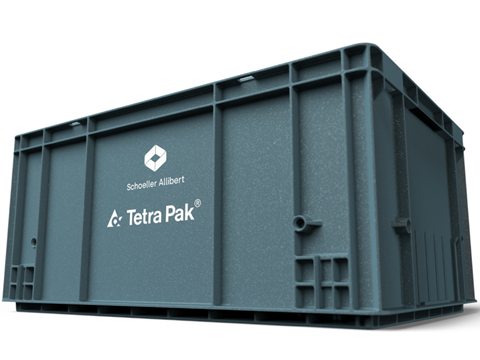
Tetra Pak and Schoeller Allibert have collaborated on a transport crate made of polyAl from used beverage cartons, due to be launched at the Plastics Recycling Show in Amsterdam, 1st-2nd April 2025.
By integrating up to 50% polyAl from used beverage cartons with raw materials from other recycled streams (without using any virgin materials), transport packaging manufacturer Schoeller Allibert says it has developed warehouse crates and other reusable logistics packaging that meets high industry standards for performance and durability and delivers a more ‘sustainable and cost-competitive’ alternative to conventional offerings.
The crates are currently undergoing rigorous quality and durability field tests. Once validated, Tetra Pak plans to gradually replace over 50,000 crates used at its global spare parts distribution centre in Lund, Sweden. Schoeller Allibert is also engaging with other potential customers to adopt this material for their returnable transport packaging.
According to Tetra Pak, aseptic beverage cartons are made up of 70% paperboard on average, made from wood sourced from FSC certified forests and other controlled resources. The remainder is made up of a thin aluminum layer that shields food from light and oxygen and thin layers of polymers that block moisture and hold the layers together.
The company adds that such multi-layered structures enable the package to protect the food inside and allow for distribution and storage at room temperature. In recycling, the fibres in the cartons are extracted at paper mills. Apparently, the remaining mixture of polymers and aluminium can be turned into polyAl pellets for products such as pallets, crates, logistics packaging and outdoor furniture.
Marie Sandin, managing director of Tetra Pak Sweden, comments: “At the Tetra Pak site in Lund, Sweden, we have actively worked over the past year to introduce sustainable and recycled materials in everything we do. We now have both indoor and outdoor furniture for our employees made from polyAl material. Our objective with this initiative, together with Schoeller Allibert, was to develop a sustainable and cost-efficient crate that delivers high performance. The results look very promising for our daily operations, using polyAl crates made from approximately 200 recycled beverage cartons each.”
Last December, Tetra Pak made a joint investment with Yellow Dreams of around €3 million to launch operations at a recycling plant for polyAl from used beverage cartons – set to begin operations in the second half of 2025 and boost recycling capacity in the EU. It is anticipated that the recycled polyAl can replace virgin and other recycled plastics in injection moulding, extrusion, and thermoforming applications.
More recently, the company partnered with Nissha Metallizing Solutions to create an aseptic beverage carton with a paper-based barrier, featuring paper from FSC-certified sources. The paper-based barrier is expected to have downstream benefits where cartons with a higher fibre yield are likely to become more attractive to paper mills.
If you liked this story, you might also enjoy:
The ultimate guide to the Packaging and Packaging Waste Regulation in 2024
How are the top brands progressing on packaging sustainability?
Sustainable Innovation Report 2024: Current trends and future priorities
Everything you need to know about global plastic sustainability regulation












No comments yet